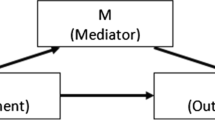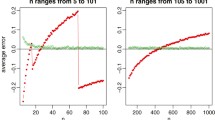Abstract
We compare the performance of two adaptive designs and equal allocation in a clinical trial with two highly successful treatments and binary outcomes. The measure of interest in the trial is the odds ratio. The goal of the adaptive design is to decrease the total number of failures compared to equal allocation while keeping the power at the same level. One design is based on sequential maximum likelihood estimation, the other on an urn model. We find that the urn model produces a better procedure than the sequential maximum likelihood approach and equal allocation, in that it yields fewer expected treatment failures, maintains the power of the asymptotic test, and is more powerful when the Fisher’s exact test is used. We conclude that adaptive designs have attractive properties when both treatments are highly successful.
Similar content being viewed by others
References
Friedman LM, Furberg CD, DeMets DL. Fundamentals of Clinical Trials. Boston, MA: Wright PSG; 1981, 41.
Melfi V, Page C. Variability in adaptive designs for estimation of success probabilities. In New Developments and Applications in Experimental Design. Flournoy N, Rosenberger WF, Wong WK, eds. Hay-ward, CA: Institute of Mathematical Statistics: 1998, 106–114.
Ivanova AV, Rosenberger WF. A comparison of urn designs for randomized clinical trials of K > 2 treatments. J Biopharm Stat. 2000;10:93–107.
Rosenberger WF, Stallard N, Inanova A, Harper C, Ricks M. Optimal adaptive designs for binary response trials. Biometrics. 2001;57:833–837.
Jennison C, Turnbull BW. Group Sequential Methods with Applications to Clinical Trials. Boca Raton, FL: Chapman and Hall/CRC; 2000, 329.
The COMPASS Investigators. Randomized double-blind study comparing saruplase with streptokinase in acute myocardial infarction: the COMPASS equivalence trial. J Am Coll Cardiol. 1998;31:487–493.
Connor EM, Sperling RS, Gelber R, Kiselev P, Scott G, O’Sullivan MJ, VanDyke R, Bey M, Shearer W, Jacobson RL, Jiminez E, O’Neil E, Bazin B, Del-fraissy J, Culnane M, Coombs R, Elkins M, Moye J, Stratton P, Balsley J for the Pediatric AIDS Clinical Trials Group Protocol 076 Study Group. Reduction of maternal-infant transmission of human immunodeficiency virus type 1 with zidovudine treatment. New Engl J Med. 1994;331:1173–1180.
Rosenberger WF, Seshaiyer P. Adaptive survival trials. J Biopharm Stat. 1997;7:617–624.
Rosenberger WF. Randomized play-the-winner clinical trials: review and recommendations. Control Clin Trials. 1999;20:328–335.
Wei LJ, Durham S. The randomized play-the-winner rule in medical trials. J Am Stat Assoc. 1978;73: 840–843.
Ivanova AV, Rosenberger WF, Durham SD, Flournoy N. A birth and death urn for randomized clinical trials: asymptotic results. Sankhya B. 2000;62:104–118.
Author information
Authors and Affiliations
Additional information
Grant support: For Professor Rosenberger, R29-DK51015-05 from the National Institute of Diabetes and Digestive and Kidney Diseases. This was an invited paper presented by the second author at the Pharmaceutical Research and Manufacturers Association/Food and Drug Administration Workshop, November 1, 2000, Washington, District of Columbia.
Rights and permissions
About this article
Cite this article
Ivanova, A., Rosenberger, W.F. Adaptive Designs for Clinical Trials with Highly Successful Treatments. Ther Innov Regul Sci 35, 1087–1093 (2001). https://doi.org/10.1177/009286150103500406
Published:
Issue Date:
DOI: https://doi.org/10.1177/009286150103500406




